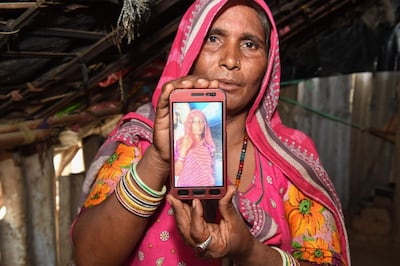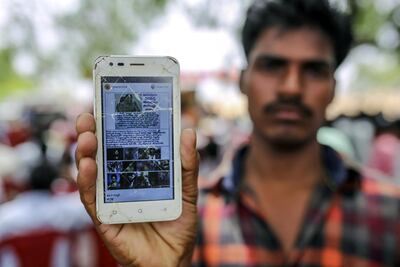In a television advertisement screened in India last week, the free messaging service WhatsApp urged citizens to "share joy, not rumours". This plaintive plea came after several incidents of vigilante violence triggered by snowballing private messages, rapidly forwarded from group to group.
Back in July, the Indian government warned the Facebook-owned service that it could not “evade accountability and responsibility” for this situation, and the current advertisement campaign forms part of WhatsApp’s response to that warning. But the problem of rumours shaping real-world events is by no means restricted to India. From Mexico to Myanmar, and from Nigeria to Brazil, WhatsApp messages spread virally, under the radar of the authorities and WhatsApp itself, resulting in stock-market crashes, political upheaval and murderous rampages. The advice to “share joy” rather than rumour is well-meaning, but there are real concerns over how to properly tackle a problem that’s deeply rooted in our psychology, exacerbated by the state of global politics and enabled by the high-level encryption used by WhatsApp.
Rumours go viral
Dani Madrid-Morales, a professor of journalism at the University of Houston, has been studying the role of WhatsApp in disseminating rumours in sub-Saharan Africa. “It has become the main tool for spreading inaccurate information,” he says. “But the tools we have to prevent it are very limited. While Twitter and Facebook might use artificial intelligence to detect misinformation, WhatsApp can’t because the service has no access to the messages.”
Forensically investigating the source of rumours is impossible, as messages are only stored on individual devices, with no record kept by WhatsApp. In addition, video and audio files within messages are stripped of metadata so the source cannot be identified. Viral messages can neither be halted in their tracks nor rebutted.
Lynchings in India
This problem has led to many incidents of street justice. Lynchings have taken place in India, with one village in the state of Maharashtra becoming a ghost town after five innocent men were murdered on suspicion of being child abductors in September. Messages raising fears of kidnapping and organ harvesting have spread in Mexico and Brazil, while countries such as Sri Lanka and Myanmar have seen ethnic tensions boil over as a result of WhatsApp rumours.

Earlier this year, the UAE's Telecommunications Regulatory Authority, concerned about the potential for rumour-fuelled panic, reminded citizens that spreading unverified news is a punishable offence carrying a fine of Dh1 million. And last week, the Poynter Institute, a journalism school in Florida, warned of misinformation spreading through WhatsApp in Nigeria to influence next February's elections. Misinformation, combined with a lack of analytical thinking on the part of the public, is having a profound effect on justice and democracy.
The psychology behind it
Many factors contribute to the viral spread of rumours, says Dr Michael Wood, a British psychology lecturer with a special interest in the spread of conspiracy theories. "Firstly there's that feeling of having inside information and being more up-to-date than your peers," he says. "Then, certain subjects will naturally provoke more rumours, such as the Zika virus scare [in Brazil], because of the uncertainty surrounding them. When situations are unclear we start psychologically grasping at straws, trying to find patterns we can use to understand events that are transpiring.
“Also, the more you’re exposed to a rumour, the more likely you are to believe it and pass it on – even if it’s implausible.”
Dubious, fantastical rumours spread much faster than the truth, several studies have confirmed. "If something is fake," notes Dr Wood, "than it has the freedom to be as interesting as it wants. But reality doesn't have that luxury – it has to be a certain level of boring".
That speed is further accelerated by the rapid global adoption of smartphones. This has its benefits, too. One of the UN's Sustainable Development Goals is to bring connectivity to rural and low-income communities, and with that comes education and empowerment. But the process is open to subversion. In the Indian state of Chhattisgarh, the government issued 2.9 million devices after promising a smartphone in every home – but those devices could then be used as channels for political campaigning. With new smartphone owners particularly susceptible to misinformation, they can become unwitting pawns in an information war.
Dubious agendas
Not all those who propagate misinformation do so innocently, however. Madrid-Morales found in a survey that one in five South Africans and one in four Kenyans and Nigerians admitted to having shared stories that they knew were made up.
"During elections, people share stories on purpose so their preferred candidate is seen more favourably among their peers," he says. "It reinforces your position – and in this polarised political environment, you want your position to win."
What we can do about it
Our instinctive urge to forward information is something WhatsApp can combat at source. In July it began labelling any messages that had been forwarded, and in India it has limited the number of group chats that messages can be forwarded to. But the firm's inability to access users' messages limits its technological options. One WhatsApp official described this as a "public health problem".
The debate surrounding the validity of end-to-end encryption continues to rage. Many governments have called on WhatsApp and Apple's iMessage to relax their security.
Last week saw the Australian government pass legislation to force technology companies to remove encryption for people under police investigation. But loosening of encryption for one government and one set of people could weaken security for us all. "Unless we are willing to give up the encryption that we so much treasure, there's little that can be done," says Madrid-Morales.
This explains WhatsApp's recent focus on educating its users, but Madrid-Morales notes that growing awareness of misinformation leads to a lowering of trust in traditional media, too. This is then exacerbated by politicians' cries about "fake news".
“No matter how many literacy campaigns there are,” he says, “they are not going to be enough, because the political climate has stopped the media being a trusted social entity.
“This shift, which has happened over the past five or 10 years, will have a very long-lasting impact on society.”
_________________________
Read more:
Are we all starting to realise that Instagram influence is 'fundamentally soulless'?
The story of Tetris: from video game to therapy
So, just how should internet users store their data?
From Amazon to Google: Why we need to pay attention to these tech giants
_________________________


